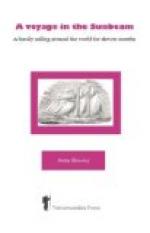At noon we were 250 miles off St. Paul’s Rocks.
Thursday, August 10th.—A very hot, showery day. Saw two large ships in the distance. In the morning we were almost becalmed for a time, but the breeze returned during the afternoon, and we were able to proceed on our course. I think this has been the most lovely of the many exquisite days we have enjoyed since we left England. It commenced with a magnificent sunrise, and ended with an equally gorgeous sunset, only to be succeeded by a beautiful moonlight night, so clear and bright that we could see to read ordinary print on deck.
Saturday, August 12th.—At noon we were 300 miles off Bahia, a place we have made up our minds not to visit, as it would lengthen our voyage considerably, and there is not much to see there. We have therefore decided to proceed direct to Rio, where we are looking forward to arrive on Wednesday or Thursday next.
The night was showery, with a good deal of wind and sea.
Sunday, August 13th.—Sailing in the tropics is really very delightful! When going to the westward, there is almost always, at this season of the year, a favourable breeze, and the weather is generally either quite fair or moderately so.
Whispered to it, westward,
westward,
And with speed it darted forward.
We had service at 11.15 a.m., and again at 5.30 p.m. The choir has considerably improved; one of our new men plays the violin very well, and frequently accompanies the children and the nurse in their songs. On a clear calm night, beneath a tropical sky, when the members of this little group assemble on deck, and, by the light of a lantern, sing some of their simple songs, the effect produced is both melodious and picturesque.
The wind dropped at about 10 p.m., and we had an unpleasant amount of roll during the night, sails flapping, spars creaking, and booms swinging as if they would pull the masts out of the vessel.
[Illustration: Vespers.]
Monday, August 14th.—This morning we saw a small schooner ahead, and thinking from her manoeuvres that she wished to speak us, we made our number and ran towards her. We soon found out, however, that she was a whaler, in chase of two large grampuses. She had two men on the look-out in the cross-trees, in a sort of iron cage; and though she was of much smaller tonnage than the ‘Sunbeam,’ she carried five big boats, one of which, full of men, was ready to be lowered into the water, the instant they had approached sufficiently near to the whale or grampus. These seas used formerly to abound with whalers, but they are now much less numerous, the seasons having been bad of late.
To-night the stars were especially brilliant, and we spent some hours in trying to make out their names. Vega, our polar star for some time to come, shone conspicuously bright, and the Southern Cross could be seen to great advantage.




